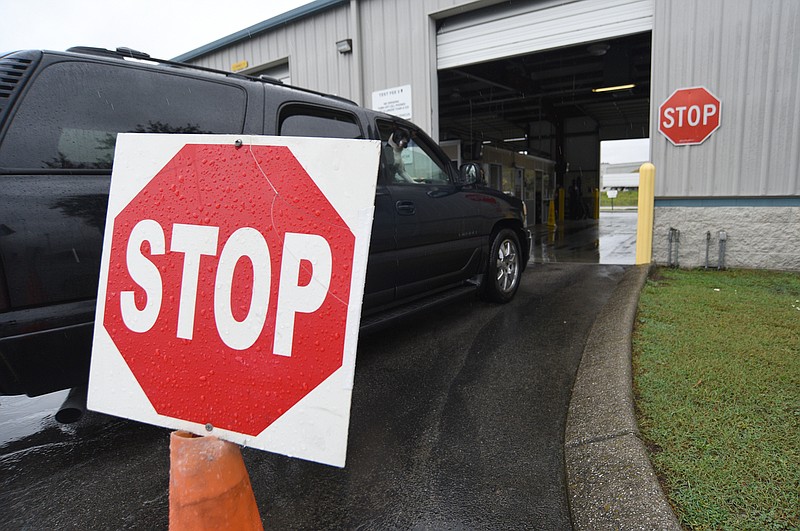NASHVILLE - Mandatory vehicle emissions testing will no longer be required in Hamilton County and four other Tennessee counties starting in mid-January after the U.S. Environmental Protection Agency gave final approval to a years-long effort to end the program aimed at curbing nitrogen oxide and carbon monoxide pollutants.
Tennessee Department of Environment and Conservation officials announced the decision, which came Tuesday when EPA formally published a notice in the Federal Register that revised the state's air quality plan.
While it takes effect Sept. 16, actual vehicle testing will continue actually until Jan. 14, 2022, in the five affected counties.
Besides Hamilton, the counties of Rutherford, Sumner, Williamson and Wilson are expected to discontinue their programs. Davidson County has chosen to continue its program.
"Emissions testing is over in Hamilton County effective January 14, 2022! Boom! The long fight is over!" tweeted state Sen. Bo Watson, R-Hixson, who along with the late Rep. Mike Carter, R-Ooltewah, led a several-year effort to pass legislation requiring Tennessee to apply to lift the testing aimed at curbing ozone pollution. That came in 2018 after state officials announced in 2017 that Tennessee and the affected counties had become fully compliant with U.S. Environmental Protection Agency ambient air quality standards for ozone and particulate emissions.
"This decision by EPA is a major step that means an end to mandatory tests of vehicles for many Tennesseans," state Environment and Conservation Commissioner David Salyers said in a news release. "It's a recognition of the improvement of our state's air quality and demonstrates the diligence Tennesseans have shown toward achieving and maintaining this goal."
Watson said in a news release that the testing no longer served a purpose, saying most modern vehicles meet emissions standards.
"This long-awaited decision is a tremendous win for the people of Tennessee," Watson said. "My only regret is Rep. Mike Carter, who also worked relentlessly to end this now needless government program, did not live to see this day."
Carter's widow, Joan Carter, who is serving a temporary appointment to her late husband's legislative seat, said she is "pleased to learn that the vehicle emissions testing program is finally coming to an end. More fuel and energy-efficient vehicles meant the program had largely outlived its usefulness, yet the financial hardship on the very Tennesseans who could least afford it remained in place.
"Thanks to Senator Watson, Leader Lamberth, TDEC, and all the great people across Tennessee who worked so hard to make this happen. Mike would be proud," she said.
Vehicle owners have long complained about the testing. Mike Carter took up their cause and said the cost, especially for low-income Tennesseans and businesses, was a financial burden to many facing expenses to fix or replace catalytic converters.
House Majority Leader William Lamberth, R-Portland, said, "I'm very proud we have finally eliminated this obsolete test that put a terrible burden on lower-income families and small business owners by forcing them to pay for needless repairs."
In a June interview with the Times Free Press, Scott Banbury, the Sierra Club Tennessee chapter's conservation program coordinator, said the environmental group didn't get involved in opposing ending the state's current program.
"Technically, it's not required to meet our daily attainment of ozone levels anymore," Banbury said. "There's been a lot of advances in terms of regulation of point sources."
EPA determined that the removal of vehicle emissions testing in Tennessee is consistent with the federal Clean Air Act and all applicable regulations.
EPA's technical analysis concluded that after removal of vehicle emissions testing, Hamilton County and the Middle Tennessee area will continue to comply with all National Ambient Air Quality Standards. Since the standards are set to protect public health and welfare, and EPA's technical analysis shows that the areas will continue to comply, the agency found the public health and welfare will continue to be protected once vehicle emissions testing is removed from Tennessee's air quality plan.
The move was opposed by Opus Inspection Inc., which has the state contract to operate emissions testing stations for Hamilton, Rutherford, Sumner, Williamson and Wilson counties.
Contact Andy Sher at asher@timesfreepress.com or 615-255-0550. Follow on Twitter @AndySher1.

